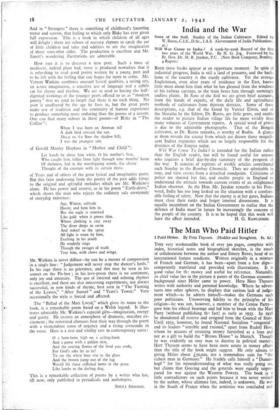The Man Who Paid Hitler
THIS very workmanlike book of over Soo pages, complete with index, historical notes and biographical sketches, is the result of collaboration between the author and Emery Reyes, head of an international feature syndicate. Written originally in a mixture of French and German, it has been—apart from a few slips— competently translated and provided with illustrations. It is good value for the money and useful for reference. Naturally, its chief value lies in the picture it paints of the German economic background since Hitler came to power. Here Herr Thyssen writes with authority and personal knowledge. Where he adven- tures into other spheres, he displays that curious lack of judge- ment which—as he admits himself—makes the Germans such poor politicians. Unswerving fidelity to the principles of his religion—he was not, however, a member of the Centre Party— gave him his ethical bearings and led him to break with the Nazi Party (without publishing tilt fact) as early as 1935. In 1938 he abandoned all reserve and resigned from the Council of State. Until 1935, however, he found National Socialism " congenial" and its leaders " sensible and rational," apart from Rudolf Hess, whom he accuses of retaining money furnished as a loan and not as a gift to build the " Brown House" in Munich. Though he was evidently an easy man to deceive in political matters, Herr Thyssen seems to have been more astute in money affairs than the title of the book might suggest. He only admits to giving Hitler about Lso,000 not a tremendous sum for " the richest man in Germany." He frankly calls himself a " Dumxn- kopf " for his misunderstanding of what was really going on, but claims that Goering and the generals were equally unpre- pared for war against the Western Powers. The book is a little contradictory on such points because it was never revised by the author, whose ultimate fate, indeed, is unknown. He was in the South of France when the armistice was concluded and
no news has been received of him since then, except a vague report that he had died in a concentration camp.
The chapters in Part HI are the best—especially those on " Nazi Quack Economy " and " Fraudulent Nazi Finance "—for they constitute an indictment based on the exact knowledge of a specialist. The facts hen revealed are of basic importance for the after-war settlement. When Herr Thyssen writes as a Rhenish Catholic his views are also of much value, for one-third of Germany claims kinship with the West owing to its acceptance of Roman culture and religion. The author insists that this claim is still maintained, and he distinguishes sharply between " Prussian" and " Western " Germany—even to the extent of advocating a separate monarch for each. BERNARD FOLEY.



























 Previous page
Previous page